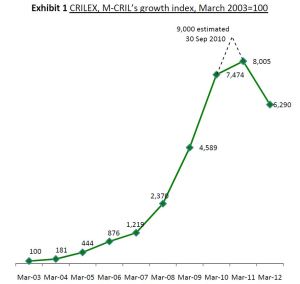You are currently browsing the tag archive for the ‘debt’ tag.
The Andhra Pradesh crisis has been something of a turning point in public assessment of microfinance, with a suicide wave caused by widespread overindebtedness badly tarnishing the sector’s image in India as well as abroad. Some Indian politicians are now beginning to identify the idea of alleviating poverty with microfinance as “crap“.
Source: M‐CRIL Microfinance Review 2012 (vii)
Microfinance in India remains in protracted decline since 2010 (see graph), although talk of “green shoots” and catharsis after “near-death experience” has been around for some time. The industry’s stance for the past two years has been to deny responsibility for any wrongdoings, downplay its role in precipitating the dozens of suicides, and claim that the AP government’s October 2010 legislation was a surprising and unjust crackdown on healthy practices. I have claimed otherwise.
Yet, fairly surprisingly, my new paper investigating the causes of the crisis, and a recent interview with SKS Microfinance senior managers come to some similar conclusions about the causes. In particular, both versions see the unregulated hyper-competitive market as a significant cause of the tragedy which led to microfinanciers’ troubles. How can this be?
Just right now, a severe microfinance crisis appears to be brewing in Southern India. A large number of suicides has led to a legal clampdown and a corporate backlash. With a complaint launched by microfinance institutions (MFIs) at the Andhra Pradesh High Court in Hyderabad against the Andhra government, the recent conflict over MFI practices and borrowers’ debt levels – debt which may be responsible for the deaths of over thirty people – has come to a head. How this case develops is bound to shed light onto what actually matters in microfinance in India today. Bluntly: is it power, profits or people?
Flashback: In August and September, nineteen microfinance borrowers in Andhra Pradesh (A.P.) took their lives because of overindebtedness blamed on microfinance – some reports say more than 30 (or even 57; see updates below). Then, in early October, the debt-driven suicide of a fruit-seller named Prabhakar in Kurnool, southern A.P., triggered public outcry and attacks on several MFI offices.
On October 14th, the A.P. state government “brought an ordinance making it compulsory for MFIs to register themselves, declare the effective rate of interest they charge, ensure that no security is sought for loans and no coercion is used for recovery. Non-compliance will be punished with a three-year prison term and a fine of Rs 1 lakh.” In response, yesterday a consortium of MFIs operating in A.P., MFIN, filed a petition at the Andhra Pradesh High Court seeking an order to squash the ordinance issued by the government (NDTV, AP). Meanwhile, another overindebted microborrower, K. Narayana, who was harassed by the agents of four MFIs, took his life by drinking poison.
Video: “The microfinance institutions hit back,” questioning A.P. government’s power of jurisdiction.
Today is World Water Day; this year operating under the heading “Clean Water for a Healthy World”. Every year since 1995, March 22 has been dedicated to “focusing attention on the importance of freshwater and advocating for the sustainable management of freshwater resources“.
The 2010 events campaign focuses specifically on raising awareness of the importance of water quality for health and human well-being, and the importance of sound water management for preventing pollution.
While that means that this year the World Water Day has no specific focus on the developing world, a global view onto water problems always naturally draws attention to the specific the problems of the developing world, where not only most of the people lacking access to safe drinking water live, where desertification and pollution are worst, and where water-borne diseases are most prevalent – just to give a few examples – but also the technical and financial means for dealing with the causes and consequences of the “water crisis” /1/ are slimmest.
In 2003, the United Nations Economic and Social Council codified a Human Right to Water in its General Comment No. 15, based on the interpretation of the pre-existing International Covenant on Economic, Social and Cultural Rights, which stated:
The human right to water entitles everyone to sufficient, safe, acceptable, physically accessible and affordable water for personal and domestic uses. An adequate amount of safe water is necessary to prevent death from dehydration, to reduce the risk of water-related disease and to provide for consumption, cooking, personal and domestic hygienic requirements.
Yet, this right remains unclaimable in many poor countries, both as a result of the failure of the international community to support the necessary steps financially, and because of a competing paradigm of “full cost recovery”. This is reason enough to have a cursory look today at the transnational governance and provision systems of water and sanitation for the poor.





